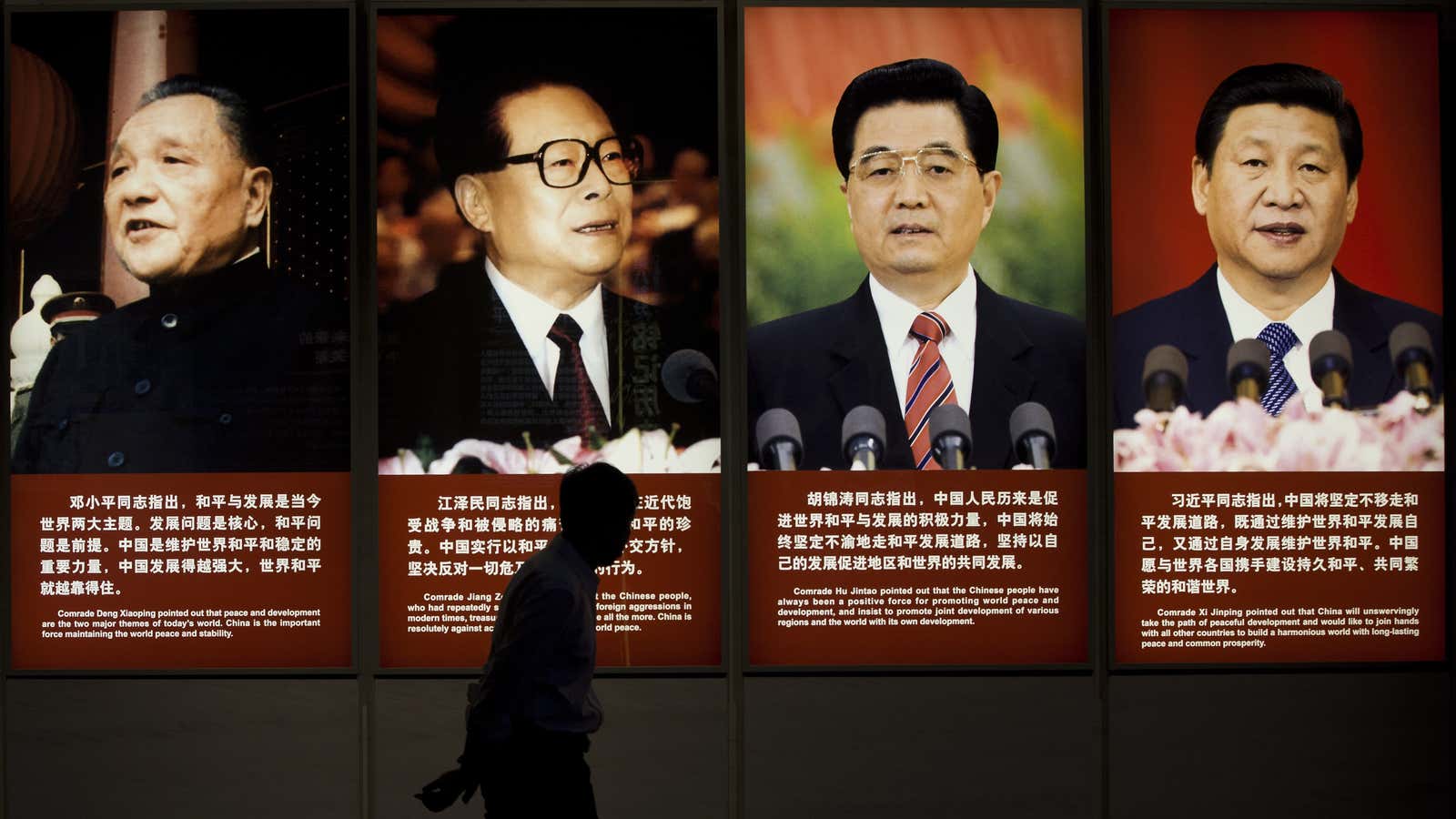There have been two transformational leaders in China since Mao Zedong ruled the country with an iron fist. One was Deng Xiaoping, the paramount leader in the 1980s who lifted China out of backwardness with economic reforms, highlighted by his motto “Hide your strength, bide your time.” The other is China’s current leader, Xi Jinping, the strongman who has declared a “new era” that sees China as a top global power as it builds infrastructure and military bases across the world.
The two leaders have headed in opposite directions in their approaches to power. The Communist Party’s central committee announced yesterday (Feb. 25) that it’s proposed removing the two-term, 10-year limit for president and vice president from the country’s constitution. The move would allow Xi to stay in power beyond his due retirement in 2022—and perhaps for life. It follows Xi breaking with a long list of norms to become the country’s most powerful leader since Mao.
A recap of the history: Deng was the first to rule out lifelong tenure in Communist Party leadership. “My last task is to take the lead in establishing a retirement system,” an 84-year-old Deng told his colleagues (link in Chinese) months before he quit all his official roles in 1989. “The natural law cannot be changed, and the leadership transition cannot be stopped.”
Apart from being the mastermind of China’s reform and opening-up, Deng in the 1980s also implemented major institutional reforms that ensured orderly succession, because “he had got the right lesson from the dictatorship of Mao Zedong,” says Willy Lam, a professor at the Chinese University of Hong Kong. But now, “all these reforms have been overturned by Xi Jinping.”
Accepted terms
The term “president”—originally translated as “state chairman” in English—has a complicated history in modern China. The office was first established in 1954 and held by Mao. In 1959, Mao gave the position to his then-chosen-successor Liu Shaoqi, while staying in power as chairman of the Communist Party—the supreme leadership role in China. But both Liu and the presidential post fell victim of Mao’s 10-year Cultural Revolution to combat capitalism and persecute political enemies. In 1975, Mao pushed through a new constitution that emphasized the party’s rule over the state, eliminating the office of the president.
Deng fell from grace during the Cultural Revolution, but he reemerged as China’s de facto leader in 1976 after Mao’s death, and then decided to introduce a leadership-transition mechanism to prevent the rise of another Mao-like cult of personality. One of his key moves was to restore the offices of president and vice president in a new constitution ratified in 1982 (link in Chinese), and set a two-term limit for the posts. Like that, a retirement rule for Chinese officeholders had been put in place for the first time.
Although the Communist Party has never set any term limit for its top position of “general secretary” (or “chairman” during Mao’s era), Deng’s two immediate successors—Jiang Zemin and Hu Jintao—both accepted the convention that their top party roles would end with their two presidential terms. Jiang retired from the post of general secretary in 2002, and then stepped down from the presidential post in March the following year. Similarly, Hu left the party chief role in late 2012, and then retired after two terms as president in March 2013.
Xi’s path to indefinite rule
Since taking power as party chief in 2012, Xi has shown he is not shy about breaking with convention. In his ruthless anti-corruption drive, he took the unprecedented move of nabbing a former member of the Politburo Standing Committee, the pinnacle of the party’s power. In 2016, he designated himself the title of the party’s “core leader” to amass power. During the party congress last year, Xi inserted his name and signature policy into the party’s charter, an honor enjoyed by no Chinese leader while still in power since Mao. The new leadership team revealed at the end of the congress—with Xi and six other members—included nobody young enough to serve as his potential heir.
Xi’s unrivaled power is also reflected in state media reports. After the party unveiled its new leadership lineup last October, state newspapers featured a large headshot of Xi in the middle of their front pages, but didn’t include portraits of his colleagues as they’d done before. State news outlets have also referred to Xi as lingxiu, a reverent term for “leader” that has never been granted to any Chinese leader since the Mao era. Yesterday state broadcaster CCTV hailed in a commentary (link in Chinese) Xi’s efforts to eradicate poverty: “People’s lingxiu is loved by the people!”
Still, many Chinese internet users circumvented censors and mocked the idea of indefinite rule by Xi by sharing political memes. One was an image of Winnie the Pooh—often compared to Xi—hugging a huge jar of honey, with the caption: “Find the thing you love and stick with it.”
As for the outside world, Xi’s move “will enable him to move more boldly and increases the risk of his acting arbitrarily and perhaps mistakenly in international relations,” writes Jerome Cohen, an expert in Chinese law at New York University, in a blog post. “It will surely hinder China’s efforts to be respected for ‘soft power’ as well as military and economic prowess.”
Xi apparently is in no rush to name a successor now that he has abandoned Deng’s power-transition policy, notes Lam, but his own approach will likely trigger “vicious infighting” among party factions should the 64-year-old suddenly have serious health issues. “We are seeing the roots for instability within the party,” Lam says.
